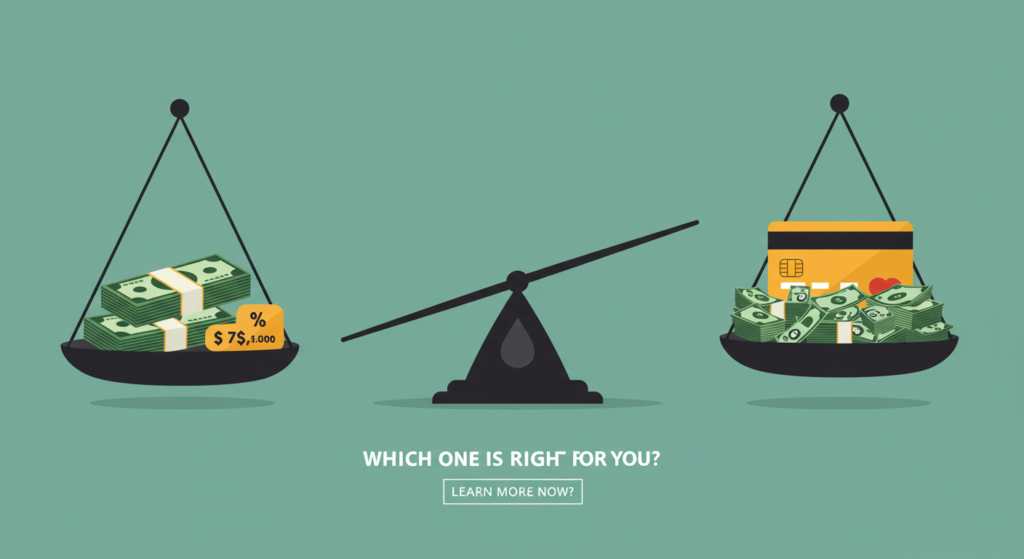Personal Loans vs. Credit Cards: Which Is Better for You?

When it comes to borrowing money, personal loans and credit cards are two of the most popular options. Each has its advantages and disadvantages, and the right choice depends on your financial situation and goals. Here’s a detailed comparison to help you decide which option is better for you.
What Are Personal Loans?
Personal loans are lump-sum loans provided by banks, credit unions, or online lenders. Borrowers repay the loan in fixed monthly installments over a predetermined period, typically ranging from 12 to 60 months.
Key Features:
- Fixed interest rates.
- Set repayment schedule.
- Loan amounts can range from $1,000 to $100,000.
What Are Credit Cards?
Credit cards provide a revolving line of credit, allowing you to borrow money up to a certain limit. You can repay the borrowed amount in full or carry a balance by making minimum payments, with interest applied to any unpaid balance.
Key Features:
- Variable interest rates.
- Flexible repayment options.
- Rewards and cashback benefits.
Pros and Cons of Personal Loans
Pros:
- Lower Interest Rates: Personal loans often have lower interest rates compared to credit cards, especially for borrowers with good credit.
- Fixed Payments: Predictable monthly payments make budgeting easier.
- Debt Consolidation: Ideal for consolidating high-interest debt into one manageable payment.
Cons:
- Upfront Fees: Some lenders charge origination fees, which can range from 1% to 8% of the loan amount.
- Less Flexibility: You receive a lump sum, which may exceed or fall short of your needs.
- Approval Process: Requires a credit check and, in some cases, additional documentation.
Pros and Cons of Credit Cards
Pros:
- Convenience: Easily accessible for everyday purchases and emergencies.
- Rewards Programs: Earn cashback, travel points, or other perks.
- No Interest with Full Payment: Avoid interest charges by paying the balance in full each month.
Cons:
- Higher Interest Rates: Credit cards typically have higher APRs compared to personal loans.
- Risk of Debt Accumulation: Carrying a balance can lead to high-interest charges and long-term debt.
- Variable Rates: Interest rates can increase if tied to market conditions.
When to Choose a Personal Loan
- Debt Consolidation: If you’re struggling with high-interest credit card debt, a personal loan can simplify payments and reduce interest costs.
- Large Expenses: Suitable for financing significant one-time expenses like home renovations or medical bills.
- Predictable Budgeting: Fixed payments make it easier to manage your monthly budget.
When to Choose a Credit Card
- Everyday Purchases: Perfect for routine expenses like groceries, dining, or gas.
- Short-Term Borrowing: If you can repay the balance in full before interest accrues.
- Earning Rewards: Great for leveraging cashback or points on regular spending.
Key Differences Between Personal Loans and Credit Cards
| Feature | Personal Loans | Credit Cards |
|---|---|---|
| Interest Rates | Lower (fixed) | Higher (variable) |
| Repayment Term | Fixed (12-60 months) | Revolving |
| Borrowing Limit | Lump sum | Credit limit |
| Best For | Large expenses, debt consolidation | Everyday purchases, short-term use |
| Fees | Origination fees | Annual fees (for some cards) |
Factors to Consider Before Choosing
- Purpose of Borrowing: Determine whether you need funds for a one-time expense or ongoing purchases.
- Credit Score: A good credit score can help you secure lower interest rates for both options.
- Repayment Plan: Consider your ability to repay within a set timeframe versus flexible payments.
- Interest Costs: Calculate the total cost of borrowing based on the interest rate and repayment term.
Final Thoughts
Personal loans and credit cards both serve valuable purposes but are suited to different financial needs. Personal loans are better for large, planned expenses or consolidating debt, while credit cards offer flexibility and rewards for everyday use. By understanding your financial goals and comparing options, you can make an informed decision that aligns with your needs.
FAQs
1. Which option has lower interest rates?
Personal loans typically have lower interest rates than credit cards, especially for borrowers with good credit.
2. Can I use a personal loan to pay off credit card debt?
Yes, consolidating high-interest credit card debt with a personal loan can save money on interest.
3. Are credit cards better for building credit?
Both options can help build credit, but credit cards are often better for demonstrating consistent, responsible use.
4. What should I consider when choosing between the two?
Think about your borrowing needs, repayment ability, and the total cost of borrowing, including fees and interest.
Leave a Reply